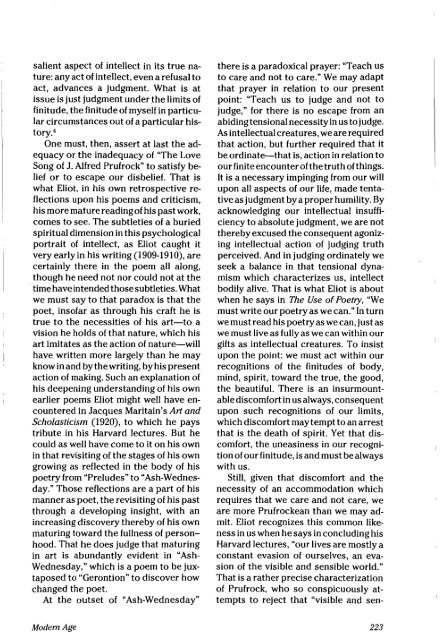T. S. Eliot Circa 1930: The Recovery of the Permanent Things
T. S. Eliot Circa 1930: The Recovery of the Permanent Things
T. S. Eliot Circa 1930: The Recovery of the Permanent Things
You also want an ePaper? Increase the reach of your titles
YUMPU automatically turns print PDFs into web optimized ePapers that Google loves.
issue is just judgment under <strong>the</strong> limits <strong>of</strong><br />
finitude, <strong>the</strong> finitude <strong>of</strong> myself in particu-<br />
lar circumstances out <strong>of</strong> a particular his-<br />
tory.4<br />
One must, <strong>the</strong>n, assert at last <strong>the</strong> ad-<br />
equacy or <strong>the</strong> inadequacy <strong>of</strong> “<strong>The</strong> Love<br />
Song <strong>of</strong> J. Alfred Prufrock to satisfy be-<br />
lief or to escape our disbelief. That is<br />
what <strong>Eliot</strong>, in his own retrospective re-<br />
flections upon his poems and criticism,<br />
his more mature reading <strong>of</strong> his past work,<br />
<strong>the</strong>re is a paradoxical prayer: “Teach US<br />
to care and not to care.” We may adapt<br />
that prayer in relation to our present<br />
point: “Teach us to judge and not to<br />
judge,” for <strong>the</strong>re is no escape from an<br />
abiding tensional necessity in us to judge.<br />
As intellectual creatures, we are required<br />
that action, but fur<strong>the</strong>r required that it<br />
be ordinate-that is, action in relation to<br />
our finite encounter <strong>of</strong> <strong>the</strong> truth <strong>of</strong> things.<br />
It is a necessary impinging from our will<br />
upon all aspects <strong>of</strong> our life, made tenta-<br />
tive as judgment bya proper humility. By<br />
acknowledging our intellectual insuffi-<br />
ciency to absolute judgment, we are not<br />
<strong>the</strong>reby excused <strong>the</strong> consequent agoniz-<br />
ing intellectual action <strong>of</strong> judging truth<br />
perceived. And in judging ordinately we<br />
seek a balance in that tensional dyna-<br />
mism which characterizes us, intellect<br />
bodily alive. That is what <strong>Eliot</strong> is about<br />
when he says in <strong>The</strong> Use <strong>of</strong> Poetry, “We<br />
must write our poetryas we can.” In turn<br />
we must read his poetryas we can, just as<br />
we must live as fully as we can within our<br />
gifts as intellectual creatures. To insist<br />
upon <strong>the</strong> point: we must act within our<br />
recognitions <strong>of</strong> <strong>the</strong> finitudes <strong>of</strong> body,<br />
mind, spirit, toward <strong>the</strong> true, <strong>the</strong> good,<br />
<strong>the</strong> beautiful. <strong>The</strong>re is an insurmount-<br />
able discomfort in us always, consequent<br />
upon such recognitions <strong>of</strong> our limits,<br />
which discomfort maytempt to an arrest<br />
that is <strong>the</strong> death <strong>of</strong> spirit. Yet that dis-<br />
comfort, <strong>the</strong> uneasiness in our recogni-<br />
tion <strong>of</strong> our finitude, is and must be always<br />
with us.<br />
Still, given that discomfort and <strong>the</strong><br />
necessity <strong>of</strong> an accommodation which<br />
requires that we care and not care, we<br />
are more Prufrockean than we may ad-<br />
mit. <strong>Eliot</strong> recognizes this common like-<br />
ness in us when hesays in concluding his<br />
Harvard lectures, “our lives are mostly a<br />
constant evasion <strong>of</strong> ourselves, an eva-<br />
sion <strong>of</strong> <strong>the</strong> visible and sensible world.”<br />
That is a ra<strong>the</strong>r precise characterization<br />
<strong>of</strong> Prufrock, who so conspicuously at-<br />
tempts to reject that “visible and sen-<br />
Modern Age 223
















